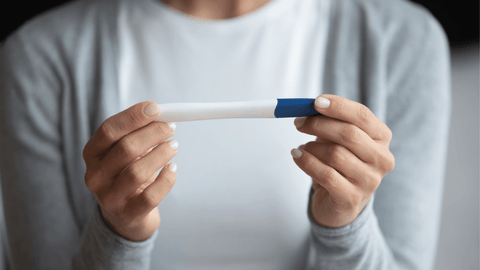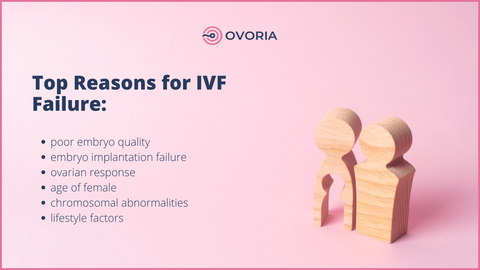Top Reasons for IVF Fail
In Vitro fertilization, sometimes known as IVF, is the most effective fertility treatment that helps people who want to achieve a successful pregnancy. Nowadays, infertility has grown to be a different disease. About 27-30 million couples are facing this issue each year, with 30% being attributed to female fertility issues or infertility that can be resolved by IVF treatment with donor eggs proven effective so far. IVF failure is not uncommon. Most couples who are struggling with infertility problems undergo IVF treatment. However, many of them can face failed IVF cycle. At times fertility specialists can identify reasons for IVF failure, but sometimes it can not be medically explained.

Top Reasons for IVF Failiure
Some of the more common causes of IVF failure include:
Embryo Implantation Failure
IVF process is complicated and consists of 5 steps:
- Ovarian Stimulation: during the first step, a woman takes medication so that healthy eggs are produced. Most months, women make only one egg, but with IVF, they stimulate 10-15 eggs to increase their chances of becoming pregnant.
- Egg Retrieval: the next step of IVF treatment involves the harvesting of eggs. Egg retrieval is done while a woman sleeps under a general anaesthetic. Once completed, an embryologist examines the eggs under a microscope to count them.
- Fertilisation: the next thing that happens is the fertilization of eggs and sperm. The timing is crucial here. The eggs are retrieved, and then, after a few hours, they're fertilized with sperm. There are two ways to fertilize an egg: Conventional insemination or ICSI. In conventional insemination, the sperm is placed in a dish containing an egg to allow them to fertilize on their own. In ICSI, one sperm is injected into the cytoplasm of a fertilized egg using a needle.
- Blastocyst Culture: once the sperm fertilizes the egg, it becomes an embryo. The embryo is then placed in a unique incubator by an embryologist, where the embryo is provided with the proper condition to develop and grow. Adequate monitoring of the embryo is done for 5-6 days.
- Embryo Transfer: once the embryo develops to the blastocyst stage, it is implanted into the uterus using a small tube called a Catheter. It usually takes place within 3-5 days after fertilisation. Once the embryo is transferred to the uterus, it is allowed to the implant, and a blood test is carried on after two weeks to measure the hormone HCG.
The embryo transfer is the last stage of the IVF cycle that means embryos will be located in the uterus, but different can hinder the embryo implantation. There are some causes that can define implantation failure:
- uterine causes: uterine fibroids, endometrial polyps, hydrosalpinx, infections, endometrial polyps, endometriosis adhesions.
- embryonic causes: changes in the embryo, in the gametes of the progenitors or in the zona pellucida of the embryo can call implantation failure during IVF cycles.
- systemic causes: autoimmune diseases, endocrine alterations and thrombophilias.
Poor Embryo Quality
A healthy egg and sperm are responsible for embryo quality. That's why lifestyle factors play a significant role in the quality of eggs and sperm. To get the best IVF treatment results, men should change their diet and lifestyle for at least three months before the procedure. This also applies to women who can improve their fertility by changing their diet and lifestyle.
Ovarian Response
The first step in the IVF cycle is ovarian stimulation. According to the IVF process, at the beginning of IVF treatment for egg production is necessary to administer a daily injection of a follicle-stimulating hormone(FSH). There is also a chance that the medication will not successfully stimulate ovaries to produce eggs because of women's age.
Age of Female
For a woman wanting to achieve pregnancy, it is imperative to be in peak health. The factors such as a healthy diet and proper sleep are the major factors in achieving a healthy body with a healthy weight. It's been proven that having no bad habits such as smoking or drinking alcohol can make women's bodies stay younger and more nutritious that will help to create a thriving environment for pregnancy. Moreover, a woman's chronological age is the best indicator of egg quality. Success rates for the IVF cycle with women own eggs are also affected by a woman’s age.
Chromosomal Abnormalities
At least 50% of miscarriages are connected with chromosomal abnormalities. Failed IVF can be affected by chromosomal abnormalities and the poor quality of the fetus. Genetic and chromosomal problems can weaken the fetus which can not have cells to grow and can causes difficulties with implantation. That's why it is important for couples to perform preimplantation genetic testing (PGD) to increase the probability of fertility treatments. PGD is a technology used during IVF cycle to increase the potential for a successful pregnancy. This genetic screening on cells removed from embryos and help choose the best quality of embryo to achieve pregnancy.
Lifestyle Factors
IVF treatment is not a magic pill in struggling with infertility. There are so many factors that affect IVF pregnancy rates. For example, stress, smoking, drinking alcohol, overweight or low weight will obstruct the road to a successful IVF cycle. Studies show that reducing stress and modification of lifestyle significantly will increase the opportunity to achieve pregnancy. Therefore, IVF specialists recommend future patients at least 3 months before IVF treatment to improve their lifestyle. A well-balanced diet, proper sleeping, quitting smoking, and drinking alcohol will positively impact fertility and increase the IVF success rate.
References:


